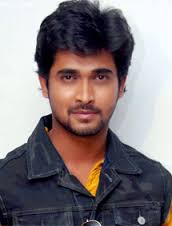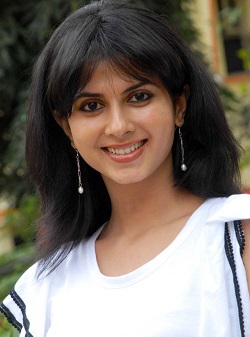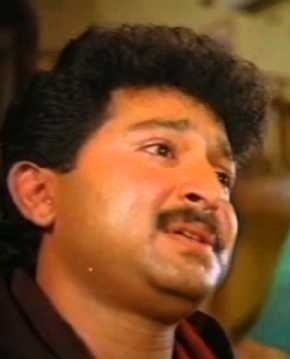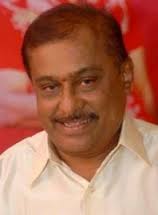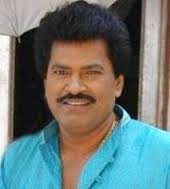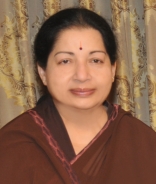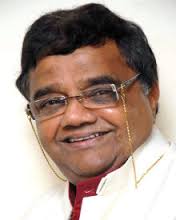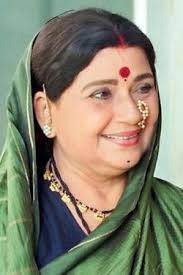
Showing all artists born at Mysore
His first film to be released was Parinaya in 2014 which took two years in the making. Subsequently he starred in few low-budget films until the multi-starrer film, Luv U Alia (2015) directed by Indrajit Lankesh.
Apart from serials and films, Chandan has been contestant for the reality shows such as Pyate Mandi Kadige Hodru , "Dancing Stars season 1" and Bigg Boss Kannada 3
From 2011 to 2014, Chandan appeared in a television soap, Radha Kalya... See full bio
Chandan Kumar mononymously known as 'Chandan', is an actor who works in television and Kannada cinema. He is known for his work in the television soap opera Radha Kalyana and later Lakshmi Baramma, in which he played the role of Chandu, that was aired on Colors Kannada from 2012. During the time, he was offered several films for which he had to step out of the serial mid-way.
His first film to be released was Parinaya in 2014 which took two years in the making. Subsequently he starred in few low-budget films until the multi-starrer film, Luv U Alia (2015) directed by Indrajit Lankesh.
Apart from serials and films, Chandan has been contestant for the reality shows such as Pyate Mandi Kadige Hodru , "Dancing Stars season 1" and Bigg Boss Kannada 3
From 2011 to 2014, Chandan appeared in a television soap, Radha Kalyana, portraying the lead role of Vishu, that was aired on Zee Kannada.
Subsequently, he was roped in for another soap, Lakshmi Baramma aired on Colors Kannada channel. The latter serial shot him to fame and made him hugely popular actor in Television. He also participated in the reality show "Pyaate Mandi Kadige Bandru" in 2010 end. He became Runner up of Bigg Boss Kannada 3 which was aired on Colors Kannada during 2016.
Bopanna's family hails from Kodagu (also known by its Anglicised former name of Coorg). Born on 4 December 1982, Daisy did her schooling from Aurobindo School, pre-university at Kumarans College and graduated with a Bachelor of Fine Arts degree from Chitrakala Parishat in Bangalore, Karnataka. She is married to Amit Jaju, a forensic analyst and son of Prakash Jaju.
Being academically proficient and coming from an intellectual and highly educated family, Daisy was interested in pursuing a career in advertising as a copywriter. But the call of the entertainment industry proved too s... See full bio
Daisy Bopanna is an Indian actress in Bollywood and Kannada films. She also had acted in Telugu and Tamil language films. She has worked with Superstars like Kamal Hassan in Rama Shama Bhama, Upendra in Aishwarya, and Akshay Kumar in Garam Masala.
Bopanna's family hails from Kodagu (also known by its Anglicised former name of Coorg). Born on 4 December 1982, Daisy did her schooling from Aurobindo School, pre-university at Kumarans College and graduated with a Bachelor of Fine Arts degree from Chitrakala Parishat in Bangalore, Karnataka. She is married to Amit Jaju, a forensic analyst and son of Prakash Jaju.
Being academically proficient and coming from an intellectual and highly educated family, Daisy was interested in pursuing a career in advertising as a copywriter. But the call of the entertainment industry proved too strong and she put on hold her intellectual ambitions and opted to work in front of the camera.
She started with theater, working for a short time with B. Jayasri’s Spandana theatre camp and also contemporary English theatre with Preetam Koilpillai, and never looked back. Her first movie Bimba (The Image) was sent to the prestigious Berlin & Frankfurt Film Festival, winning international awards. The movie, directed by Kavitha Lankesh, explored the exploitation of child artistes in the film industry. Her later work in Bhagavan with Darshan earned her the tag of "Spicy Daisy".
After that Daisy went on to act in many films like Rama Shyama Bhama, Thavarina Siri, Aishwarya, Satyavaan Savitri, Gaalipata, Olave Jeevana Lekkachara, Crazy Loka and other films. Daisy proved that she is a good performer in all these films. Daisy event went on to act in Hindi films like Garam Masala where she was seen opposite Akshay Kumar and John Abraham. Though the film was a hit, Daisy had to wait for another two years to find herself a next project. The next project came in the form of United Six which was an average at the box-office.
She starred in more than 150 regional ads before being cast in the Priyadarshan movie Garam Masala. She has also starred in a Tamil and Telugu film, opposite leading stars like Kamal Hassan, Ravi Teja and Ganesh. Her first ad film was with veteran ad film maker Rajiv Menon.
Sangavi was born "Kavya Ramesh" on the 4th of October 1975. She did her schooling from Marimallappa School in Mysore. Her grandmother's sister is Kannada film actress Aarathi.
Sanghavi is an Indian film actress and model. She has appeared in over 95 Tamil, Kannada and Telugu-language films. Her father was professor & H.O.D in E.N.T, Mysore Medical College
Sangavi was born "Kavya Ramesh" on the 4th of October 1975. She did her schooling from Marimallappa School in Mysore. Her grandmother's sister is Kannada film actress Aarathi.
His major Tamil appearance was opposite Kamal Haasan in musical Kalaignan as the psychopath doctor. He is the son of Chi. Udaya Shankar.
Chi Guru Dutt as directed Aryan starring Shivarajkumar, Ramya and Sarath Babu due to sudden demise of Veteran director D. Rajendra Babu.
Guru Dutt is an Indian actor and director primarily concentrating on Kannada and Tamil feature films. He debuted along with Shivrajkumar in the 1986 blockbuster Anand. He was launched in Tamil by K. Balachander with the 1989 smash hit Pudhu Pudhu Arthangal. He has acted in Ennarukil Nee Irunthal and more than 100 films .
His major Tamil appearance was opposite Kamal Haasan in musical Kalaignan as the psychopath doctor. He is the son of Chi. Udaya Shankar.
Chi Guru Dutt as directed Aryan starring Shivarajkumar, Ramya and Sarath Babu due to sudden demise of Veteran director D. Rajendra Babu.
Hamsalekha is usually referred to by the title Naadha Brahma (English: The Brahma of Music) who is considered to be the major cause for the change in the music composing and lyric writing style which would appeal much to the younger generation.He integrated folk and introduced western musical sensibilities into the mainstream cinema. He is also accredited for introducing many musical talents (singers, composers and lyricists) to the industry.
Hamsalekha has won one National Film Awards and six Filmfar... See full bio
Hamsalekha (born Govindaraju Gangaraju on 23 June 1951) is an Indian film composer and a songwriter who works in South Indian cinema, predominantly in the Kannada film industry since the late 1980s. He is also a screenplay writer, dialogue writer, instrumentalist and a conductor. Composed and written for over 300 feature films.
Hamsalekha is usually referred to by the title Naadha Brahma (English: The Brahma of Music) who is considered to be the major cause for the change in the music composing and lyric writing style which would appeal much to the younger generation.He integrated folk and introduced western musical sensibilities into the mainstream cinema. He is also accredited for introducing many musical talents (singers, composers and lyricists) to the industry.
Hamsalekha has won one National Film Awards and six Filmfare Awards in the Best Music Director Category; seven Karnataka State Film Awards - four for music direction and three for lyrics - and is a recipient of honorary doctorate, conferred by the Bangalore University.
Hamsalekha was born Govindaraju Gangaraju in Mysore, India. After his studies, he was employed in his father's printing press and subsequently joined his brother Balakrishna's orchestra group.He had a huge flair for writing poetry and forming a tune for his works. He renamed himself as "Hamsalekhani" since he always used to write with a "Swan"(Kannada : Hamsa) brand pen. Later, his teacher modified his name as "Hamsalekha".
He was introduced into feature films by director M. N. Prasad, who provided an opportunity to write a song for the film Triveni (1973). The song "Neena Bhagavantha" was his first release picturised on actor Uday Kumar. His debut film as a musician was the 1981 unreleased film Rahuchandra. Officially, his cinema career started as a dialogue and lyric writer for the film Naanu Nanna Hendthi (1985). Later his popularity soared only after his association with actor-director Ravichandran. Premaloka, released in 1987, brought them together for a collaboration that would endure for over 12 years.
Hamsalekha is married to Latha who was a playback singer in the 1990s. The couple have a son named Alankar and a daughter named Nandini. Alankar is associated with films as an actor and musician. Few of his released and unreleased movies are Sugghi, Tapori and Roja. Nandini began her playback singing career with the film Sixer (2006).
After working on Premaloka, Hamsalekha became one of the most prolific music directors in Kannada film, with many hits. He made occasional use of many genres of music, including Western, pop, rock, hip hop, Indian classical, folk, ghazals, Sufi, and item songs.
"Chandakinta Chanda", a ghazal he composed for the film Sparsha, was a major hit. He has created songs ranging from the philosophical ("Le Le Marula" in Shaapa, a film whose story he wrote himself) to the naughty ("Kaayi Kaayi Nuggekaayi Mahimege" in Halli Maestru), the patriotic ("Huttidhare Kannada Nadalli Hutta Bekku" in Rajkumar's Aakasmika, a song which has become an unofficial anthem of Karnataka) and love songs ("Ele Hombisile..." in Halunda Tavaru).
He composed the background score for one movie using a single instrument and made the music for Kona Eedaite with no instruments at all. His music in the film Hagalu Vesha had a rustic and folk feel without the use of synthetic sounds. His music in the 2010 movie Naanu Nanna Kanasu was appreciated by critics as well as audiences.He also composed for the National Award winning movie Puttakkana Highway in 2011.
The melodic structure of his songs demand considerable vocal virtuosity, and have found expressive platform amongst some of India's respected vocalists and playback singers, such as Dr. Rajkumar, P. B. Sreenivas, P. Susheela, K. J. Yesudas, S. P. Balasubrahmanyam, Vani Jairam, S. Janaki, K. S. Chithra, Kavita Krishnamurthy, Manjula Gururaj, Sonu Nigam, Hariharan and Shreya Ghoshal with majority of the songs recorded by S. P. Balasubrahmanyam, S. Janaki and K. S. Chithra. He recorded some of the rare and distinct voices like M. Balamuralikrishna for a song in Muthina Haara (1990), C. Ashwath for Hoovu Hannu (1993) and Pankaj Udhas for Sparsha (2001).
Prabhakar started his film career by appearing in a negative role in small-budget movies. His first film was Kaadina Rahasya. As his career progressed, he acted in stunt, action, and thriller movies. After he fought with a real Tiger in the movie Huli Hejje, His fans started calling Him Tiger Prabhakar.
After gaining recognition, he went on to act in Tamil, Telugu, Hindi, and Malayalam movies. He appeared in around 450 movies. His natural acting in many of Chiranje... See full bio
Tiger Prabhakar (Kannada: ಟೈಗರ್ ಪ್ರಭಾಕರ್; 30 March 1950 – 25 March 2001), also known as Kannada Prabhakar, was an Indian film actor known for his works predominantly in Kannada and Telugu cinema, with a few Malayalam, Tamil and Bollywood films. He is known for his villainous roles.
Prabhakar started his film career by appearing in a negative role in small-budget movies. His first film was Kaadina Rahasya. As his career progressed, he acted in stunt, action, and thriller movies. After he fought with a real Tiger in the movie Huli Hejje, His fans started calling Him Tiger Prabhakar.
After gaining recognition, he went on to act in Tamil, Telugu, Hindi, and Malayalam movies. He appeared in around 450 movies. His natural acting in many of Chiranjeevi's films as villain earned him the name "Kannada Prabhakar".
He produced films like Mahendra Varma and Mister Mahesh kumar. It was his own banner produced by Him.Both films were box-office hits.
In the mid-1980s Prabhakar was the most popular and demanded actor from all producers. He acted in number of emotional, family-oriented movies with top heroines like Aarthi, Manjula, Bhavya, etc. He'd played the role of a criminal Anil Raj in Amitabh Bachchan-Sridevi starrer Inquilaab. He acted in some Malayalam movies with actors such as Mammootty and Suresh Gopi.
Prabhakar introduced Kanglish into Kannada movies. Kanglish is a mix of Kannada and English dialogues. Many mimicry artists recite his Kanglish dialogues.
Prabhakar was married thrice. He had two daughters Bharathi, Geetha and a son, actor Vinod from his first marriage. He then married actress Jaimala and had a daughter together, Soundarya. His third wife was another actress, Anju, with whom he had a son, Arjun.
However, his latter two marriages ended in divorces. A philanthropist, he was known to have made donations to many charity organisations during his career as an actor. His political aspirations never took off.
Prabhakar had met with a bike accident in the mid-1980s, the injuries sustained from which took a toll on his health. Following this, in the early 2000s, he suffered from multiple organ dysfunction syndrome. Owing to these illness, he died in Mallya Hospital in Bangalore at 9:45 p.m. on 25 March 2001.
Jayalalithaa Jayaraman born 24 February 1948), commonly referred to as Amma and Puratchi Thalaivi by members in her party; also called as Selvi J.Jayalalitha, or Kumari Jayalalitha or Jaya or Jayalalitha Jayaram, is an Indian politician and the Chief Minister of Tamil Nadu, in office since 2015. Previously she served as Chief Minister from 1991 to 1996, in 2001, from 2002 to 2006 and from 2011 to 2014. She was an actress before her entry into politics and appeared in 140 films which includes Tamil, Telugu, and Kannada films. As a leading actress in films from 1961 to 1980, she was considered as one of the most prolific and most versatile actress having appeared in films of different genres and for performing wide variety of characters. She was also known for her dancing skills.She is referred to as the q... See full bio
Jayalalithaa Jayaraman born 24 February 1948), commonly referred to as Amma and Puratchi Thalaivi by members in her party; also called as Selvi J.Jayalalitha, or Kumari Jayalalitha or Jaya or Jayalalitha Jayaram, is an Indian politician and the Chief Minister of Tamil Nadu, in office since 2015. Previously she served as Chief Minister from 1991 to 1996, in 2001, from 2002 to 2006 and from 2011 to 2014. She was an actress before her entry into politics and appeared in 140 films which includes Tamil, Telugu, and Kannada films. As a leading actress in films from 1961 to 1980, she was considered as one of the most prolific and most versatile actress having appeared in films of different genres and for performing wide variety of characters. She was also known for her dancing skills.She is referred to as the queen of Tamil cinema. She is the general secretary of All India Anna Dravida Munnetra Kazhagam (AIADMK). She is popularly referred to as Puratchi Thalaivi, Thanga Gopuram, Thanga Chillai and Thanga Tharagai (Golden Maiden) by her followers. In 2001, an additional letter "a" was appended to the spelling of her name for reasons related to numerology. As an actress, she frequently worked with another actor-turned-politician, M. G. Ramachandran (MGR). This led to wide speculation that Jayalalitha was introduced to politics by MGR. However, she has denied these claims and stated that she had entered politics by choice. She was a member of the Rajya Sabha, elected from Tamil Nadu, from 1984 to 1989. Soon after the death of MGR, Jayalalitha proclaimed herself his political heir. She is the second female chief minister of Tamil Nadu after Janaki Ramachandran. Jayalalithaa became the first incumbent chief minister in India to be disqualified from holding office due to conviction in a disproportionate assets caseon 27 September 2014. On 11 May 2015, the Karnataka High Court acquitted Jayalalithaa in the disproportionate assets case, and she resumed office as Chief Minister on 23 May. She was subsequently re-elected by the electorate of the Dr. Radhakrishnan Nagar constituency of North Chennai in a by-election held on 27 June 2015. She was re-elected as Chief Minister on 19 May 2016 and took the oath as Chief Minister for the sixth time on 23 May 2016.
Early life, education and family
Jayalalitha was born on 24 February 1948, at Melukote, in Pandavapura taluka, Mandya district, then in Mysore State (now Karnataka) to Jayaram and Vedavalli in a Tamil Iyengar Brahmin family. Jayalalitha was given her grandmother's name Koamalavalli at the time of birth. As per Brahmin custom, 2 names are given - one ancestral grandmother name and other being personal name. The personal name Jayalalitha was adopted at the age of 1 for the purpose of using the same in school and colleges. It was derived from the names of two houses where she resided in Mysore. One was "Jaya Vilas" and the other "Lalitha Vilas". Her paternal grandfather, Narasimhan Rengachary, was in the service of the Mysore kingdom as a surgeon, and served as the court physician to Maharaja Krishna Raja Wadiyar IV of Mysore. Her maternal grandfather, Rangasamy Iyengar, moved to Mysore from Srirangam to work with Hindustan Aeronautics Limited. He had one son and three daughters - Ambujavalli, Vedavalli and Padmavalli. Vedavalli was given in marriage to Narasimhan Rengachary's son, Jayaram. The couple Jayaram-Vedvalli had two children: a son Jayakumar and a daughter, Jayalalitha. Her mother, her relatives and later co-stars and friends referred her as Ammu. Jayalalitha's father, Jayaram, was a lawyer, but never worked and squandered most of the family money. He died when Jayalalitha was two years old. The widowed Vedavalli returned to her father's home in Bangalore in 1950. Vedavalli learnt shorthand and typewriting to take up a clerical position to help support the family in 1950. Vedavalli's younger sister Ambujavalli had moved to Madras and was working as an air hostess since 1948 and was also acting in dramas and films using the screen name Vidyaavathy since 1951. After a while, on insistence of Ambujavalli, Jayalalithaa's mother Vedavalli also relocated to Madras and stayed with her sister since 1952. Vedavalli worked in a commercial firm in Madras and began dabbling in acting since 1953 under screen name Sandhya. Jayalalitha remained under care of her mother's sister Padmavalli and with maternal grandparents from 1950 to 1958 in Mysore. Vedavalli took on the name Sandhya and began to work as an actress, first in local drama companies and then in Tamil cinema. She took on the screen name of Sandhya. While still in Bangalore, Jayalalithaa attended Bishop Cotton Girls' School. In later interviews, Jayalalithaa spoke emotionally about how she missed her mother growing up in a different city, and she had the opportunity to visit her mother during summer vacations. After her aunt Padmavalli's marriage in 1958, Jayalalitha moved to Chennai and began to live with her mother. She completed her childhood education at Sacred Heart Matriculation School (popularly known as Church Park Presentation Convent or Presentation Church Park Convent) in Chennai. She excelled at school and was offered a government scholarship to pursue further education. She won Gold State Award for coming first in 10th standard in not just her school but also in Tamil Nadu. She appears not to have accepted the admission offered to her at Stella Maris College, Chennai. She is fluent in several languages, including Tamil, Telugu, Kannada, Hindi, Malayalam and English. Her brother Jayakumar, his wife Vijayalakshmi and his daughter Deepa lived in T.Nagar Chennai. Her brother died in 1995 in an accident
Early career In Chennai, Jayalalitha trained in classical music, western classical piano, and various forms of classical dance, including Bharatanatyam, Mohiniattam, Manipuri and Kathak. She learnt Bharatnatyam and dance forms under K.J.Sarasa. She became an accomplished dancer and gave her debut dance performance at the Rasika Ranjani Sabha in Mylapore in May 1960. The Chief Guest at the Arangetram was Shivaji Ganesan , who expressed wish that Jayalalitha becomes a film star in future. While a child, Jayalalithaa acted in the Kannada-language Sri Shaila Mahathme (1961), which had Rajkumar and Krishna Kumari in lead roles. She had been taken to the studio by her mother as her mother was shooting in the same premises for a different film. While Jayalalithaa was watching the shooting, a problem arose as the child actor playing the Goddess Parvathy in a school drama scene in the film had not turned up and the producer Neerlahalli Thalikerappa and director Aroor Pattabhi asked Sandhya if Jayalalitha could be asked to act in the dance sequence. Sandhya agreed and Jayalalitha was swiftly dressed up as Parvathy and the scene was shot. She played Krishna in a three-minute dance sequence held on stage in the Hindi film Manmauji (1962) and danced with Kumari Naaz who played Radha. Y. G. Parthasarathy ran the drama troupe United Amateur Artistes (UAA), which staged English and Tamil plays. Soon Jayalalitha while a schoolgirl began acting in some plays of Parthasarathy along with her mother and aunt. She acted in small roles in plays such as Tea House of the August Moon and Undersecretary between 1960 and 1964. Shankar Giri, the son of the former Indian President V. V. Giri, saw her small role in the English play Tea Houses of August Moon and was impressed. Shankar Giri approached her mother Sandhya and told he wanted to cast her daughter in an English film called The Epistle. Sandhya reluctantly agreed with the condition that shooting should be held only during weekends or school holidays. Sandhya had acted in the 1964 Tamil film Karnan, produced and directed by Kannada film-maker B. R. Panthulu. Jayalalithaa accompanied her mother to a party related to the film and was spotted by Panthulu, who then decided to cast her opposite Kalyankumar in the Kannada movie Chinnada Gombe. He promised to finish all shooting within two months in order not to interfere with her education. Since Jayalalitha would be studying for her PUC in two months' time, Sandhya had declined the offer initially. Sandhya agreed when that promise was made and Jayalalithaa started acting and she was paid Rs. 3,000. Panthulu kept his promise and completed shooting in six weeks. Jayalalithaa had forgotten all about films after acting in her Kannada debut film and had got ready to attend classes at Stella Maris as she had an ambition to be a lawyer. But the Kannada debut film became a blockbuster in 1964 and she became a well-known face. Meanwhile, Jayalalithaa continued acting in Parthasarathy's plays. She played the leading role in plays such as Malathi, The Whole Truth, and the dance drama Kaveri Thanda Kalaiselvi between 1960 and 1966. She made her debut as the lead actress in Kannada films while still in school, age 15, in Chinnada Gombe (1964). She also appeared in a dance sequence of a song named "Malligeya Hoovinantha" in the movie Amarashilpi Jakannachari (1964). She made her debut in Tamil theatre in April 1964, when she played a sales girl in the drama named Undersecretary. Parthasarthy and Sandhya were the lead characters, while Jayalalitha and Cho Ramaswamy were paired together and A. R. Srinivasan was also involved. The play was based on the lives of middle aged couple and Jayalaitha played character of sales girl in the drama. Her performance caused Parthasarthy to make her lead heroine in a drama named Malathy. Meanwhile, the films she had shot during her vacation in April–May 1964 - Chinnada Gombe and Manushulu Mamathalu - became blockbusters. By end of 1965 she had become popular among film producers and directors. She was approached by C. V. Sridhar for her Tamil film debut as well. Between 1964 and 1966 she did around 35 shows of drama named Malathy and later discontinued as she became very busy in films. It was during the year 1964, financial debts had increased of Sandhaya and she suggested her daughter to make use of the increasing film offers coming her way. Jayalalithaa's debut in Tamil cinema was the leading role in Vennira Aadai (1965), directed by C. V. Sridhar. She made her debut in Telugu films as lead actress in Manushulu Mamathalu opposite Akkineni Nageshwara Rao. Her last Telugu release was also opposite Akkineni Nageswara Rao in the film Nayakudu Vinayakudu, which was released in 1980. She was the first heroine to appear in skirts in Tamil films. She acted in one Hindi film called Izzat, with Dharmendra as her male costar in 1968. She starred in 28 box-office hit films with M.G. Ramachandran between 1965 and 1973. The first with MGR was B.R. Panthalu's Aayirathil Oruvan in 1965 and their last film together was Pattikaattu Ponnaiya in 1973. She had 11 successful releases in Tamil in 1966. In the opening credits of Arasa Katalai, for the first time her name was affixed with the phrase Kavarchi Kanni. In 1967 she bought her bungalow, Veda Nilayam, in Poes Gardens for 1.32 lakhs. Sandow M. M. A. Chinnappa Thevar was on the lookout for a regular heroine for his production after he had fight with the actress Savithri after the release of Vetaikkaran, and he signed Jayalalitha on in 1965. She became a regular heroine for production house Devar films from 1966. Jaishankar was romantically paired with Jayalalithaa in eight Tamil films including Muthuchippi, Yaar Nee?, Nee (film), Vairam, Vandhale Magarasi, Bommalattam (1968 film) (1968), Raja Veetu Pillai and Avalukku Aayiram Kangal whereas the films Thanga Gopuram and Gowri Kalyanam had him play elder brother to her. Jayalalitha acted in twelve films as heroine opposite N. T. Rama Rao, in Telugu - Gopaludu Bhoopaludu (1967), Chikkadu Dorakadu (1967), Tikka Shankaraiah (1968), Niluvu Dopidi (1968), Baghdad Gaja Donga (1968), Kathanayakudu (1969 film) (1969), Kadaladu Vadaladu (1969), Gandikota Rahasyam (1969), Ali Baba 40 Dongalu (1970), Shri Krishna Vijayam (1970), Shri Krishna Satya (1971), Devudu Chesina Manushulu (1973). Jayalalitha had 7 films with Akkineni Nageswara Rao in Telugu - Manashulu Mamatalu (1965), Aastiparulu (1966), Brahmachari (1968), Aadarsa Kutumbam (1969), Adrushtavanthalu (1969), Bharya Biddalu(1971), Nayakudu Vinayakudu (1980). She also made guest appearance in Navarthi (1966). In 1969, in Tamil Conference held, she was given the tag of Kaviri Thandha Kalai Selvi. She has been given on-screen credit as Kalai Selvi in most of her Tamil films since 1967. Later career She acted with Ravichandran in 10 Tamil hit films including Gowri Kalyanam (1966), Kumari Penn (1966), Naan (1967), Magarasi (1967), Maadi Veettu Mappilai (1967), Panakkara Pillai (1968), Moondru Yezhuthu (1968), Andru Kanda Mugam (1968), Avalukku Aayiram Kangal and Baghdad Perazhagi (1974). In 1972, Jayalalithaa acted opposite Sivaji Ganesan in Pattikada Pattanama, which went on to win the National Film Award for Best Feature Film in Tamil in 1973. It fetched her a Filmfare Award for Best Actress. Her performances in Chandhrodhayam, Adimai Penn, Engirundho Vandhaal fetched her Special Award from Filmfare and Tamil Nadu government in 1966,1969 and 1970. Her performance in Pattikada Pattanama, Suryagandhi were critically acclaimed and won her Filmfare Award for Best Actress in 1972 and 1973 respectively. In 1973, she acted in the Telugu Sri Krishna Satya which won her Filmfare Award for Best Actress in Telugu. Her other films with Sivaji Ganesan include Galatta Kalyanam and Deiva Magan; the latter holds the distinction of being the first Tamil film to be submitted by India for an Academy Award for Best Foreign Language Film. Jayalalitha was paired opposite Sivaji Ganesan in 17 films as his heroine and as his daughter in their first film named Motoram Sunderapillai. Jayalalitha had 6 films with R. Muthuraman as a romantic leading pair - Dhikku Theriyadha Kaattil, Thirumangalyam, Kanavan Manaivi, Avandhan Manidhan, Suryagandhi, Anbu Thangai whereas Muthuraman played supporting roles in Kannan En Kadhalan, Major Chandrakanth, Naan (1967 film), En Annan, Adi Parashakti, Thaer Thiruvizha, Dharmam Engey, Chitra Pournami and Oru Thaai Makkal. She later appeared opposite Sivakumar in Kandan Karunai and Shri Krishna Leelai and Sivakumar played supporting roles in Shakti Leelai, Yarrukum Vetkam Ilali, Thirumangalyam, Annaivelakanni, Kavalkaran, Motoram Sunderapillai and Ganga Gowri. She made her debut in Malayalam with Jesus(1973) and the film was huge hit. Her 100th film was Thirumangalyamreleased in 1974 directed by A.Vincent. Her last film in Tamil was the 1980 picture Nadhiyai Thedi Vandha Kadal but the last film she worked on, in which she played the lead heroine, was a Telugu film in 1980, named Nayakudu Vinayakudu, which became the highest grosser of the year in Telugu. During the 1960s and 1970s, she starred opposite M. G. Ramachandran in a number of successful films, including Aayirathil Oruvan, Kavalkaran, Adimai Penn, Engal Thangam, Kudiyirundha Koyil, Ragasiya Police 115 and Nam Naadu. Cho Ramaswamy casted her in the lead role in his directorial venture Yarrukkum Vetkam Illai. The heroes of her films never objected to the title of the film being conferred on the female lead played by Jayalalitha. Adimai Penn, Kanni Thaai, and Kannan En Kadhalan had Ramachandran as the lead male hero but the story and the title was built around the character played by Jayalalithaa. Similarly, Engerindo Vandhaal, Sumathi En Sundari, and Anbai Thedi had Sivaji Ganeshan as the male lead but the title and the story was built around her character. She did many female-centric films where the story revolved on her character, such as Vennira Adai, Yaar Nee?, Kumari Penn, Nee, Gowri Kalyanam, Magaraasi, Muthu Chippi, Thanga Gopuram, Avalukku Ayiram Kangal, Annamitta Kai, Vandhaale Magaraasi, Suryagandhi, Thirumangalyam, Yarukkum Vetkam Illai, and Kanavan Manaivi. Her successful Kannada films include Badukuva Daari (1966), Mavana Magalu (1965), Nanna Kartavya (1965), Chinnada Gombe (1964) and Mane Aliya (1964). Jayalalithaa holds the record for having been the Tamil actress with maximum silver jubilee hits in her career - 85 hits of 92 Tamil films as main female lead heroine and in addition she also has all 28 films in Telugu as silver jubilee hits. She was the highest paid Indian actress from 1965-1980. She made guest appearances in 9 films and 6 of her films were dubbed into Hindi. She had 119 box office hits between 1961 and 1980, of the total 125 films she did as the main female lead. Jayalalitha made a brief appearance as a chief minister crusading for prohibition in 1992 Neenga Nalla Irukkanum. Jayalalithaa won the Tamil Nadu State Film Award for Best Actress for Thanga Gopuram in 1971, Raman Thediya Seethai in 1972, Suryagandhi in 1973, Thirumangalyam in 1974, Yarukkum Vetkam Illai in 1975. Tamil Nadu State Film Award for Best Actress were not given in the years 1971 to 1976. However, in 1977, the awards for Best Actress and Best Actor were announced for the years 1971 to 1976 by way of honorary certificates by the government led by the then chief minister, Ramachandran. She has done mythological films like Kandan Karunai, Aadhi Parashakti, Shri Krishna Satya, Shri Krishna Vijayam, Shri Rama Katha, Shri Krishna Leelai, Shakti Leelai, Ganga Gowri, Annai Velankanni, and Jesus. Her period dramas include Ayirathil Oruvan, Neerum Neruppum, Mani Magudam, Adimai Penn, Ali Baba 40 Dongalu, Arasa Katalai, and Baghdad Perazhagi. She acquired the reputation of being a multi-faceted actor equally comfortable in fantasy and mythological genres as well as in modern social dramas. She and Saroja Devi have been cited as the first female superstars of Tamil Cinema. The directors who regularly casted her in their films include C. V. Rajendran, A. Bhimsingh, K. Shankar, B. R. Panthulu, P. Neelakantan, K. S. Gopalakrishnan, A. C. Tirulokchandar, T. R. Ramanna, Muktha Srinivasan and M.A. Thirumugam.
Political career: Early political career
Jayalalithaa claims that Ramachandran, who had been chief minister for the state since 1977, was instrumental in introducing her to politics. In 1982, she joined the AIADMK, which was founded by Ramachandran. Her maiden public speech, "Pennin Perumai" ("The Greatness of a Woman"), was delivered at the AIADMK's political conference in the same year. In 1983, she became propaganda secretary for the party and was selected as its candidate in the by-election for the Tiruchendur Assembly constituency. Ramachandran wanted her to be a member of the Rajya Sabha because of her fluency in English. Jayalalithaa was nominated and elected to that body in 1984 and retained her seat until 1989. Her success in her role as propaganda secretary caused resentment among high-ranking members of the party. By engineering a rift between her and Ramachandran, these members influenced Ramachandran to stop her writing about her personal life in a Tamil magazine. Despite these machinations, she remained admired by the rank and file of the party. In 1984, when Ramachandran was incapacitated due to a stroke, Jayalalithaa was said to have attempted to take over the position of chief minister or the party on the pretext that his health would prevent him from the proper execution of his duties. She successfully led the campaign in the 1984 general elections, in which the ADMK allied with the Congress. Following his death three years later, the AIADMK split into two factions: one supported his widow, Janaki Ramachandran, and the other favoured Jayalalithaa. Janaki was selected as the Chief Minister on 7 January 1988 with the support of 96 members; due in part to irregularities by speaker P.H. Pandian, who dismissed six members to ease her victory, she won a motion of confidence in the house. However, Rajiv Gandhi used Article 356 of the Constitution of India to dismiss the Janaki-led government and impose president's rule on the state. Jayalalithaa contested the subsequent 1989 elections on the basis of being MGR's political heir.
Leader of the Opposition, 1989
She was elected to the Tamil Nadu Legislative Assembly in 1989 as a representative of the Bodinayakkanur (State Assembly Constituency). This election saw the Jayalalithaa-led faction of the AIADMK win 27 seats and Jayalalithaa became the first woman to be elected Leader of the Opposition. In February 1989, the two factions of ADMK merged and they unanimously accepted Jayalalithaa as their leader and the "Two leaves" symbol of the party was restored. On 25 March 1989, quoted as one of the worst incidents to have happened in the Tamil Nadu Legislative Assembly, there was heavy violence inside the house among the ruling DMK party members and the opposition. Jayalilatha was brutally attacked and visibly molested by the ruling DMK members in front of the assembly speaker on the behest of Chief Minister Karunanidhi. Jayalalitha left the Assembly with her torn saree and this scene created huge sympathy for her and on the other hand people cursed the DMK leader and its member for meting out such ill-treatment on her. Jayalalitha drew a parallel with the shameful disrobing of Draupadi in the epic Mahabharata. At the peak of the situation, when Jayalalithaa was about to leave the house, which is seen by a section of the media as "not until I enter the house as a Chief Minister". Though some sections of media term it as a theatrics launched by Jayalalithaa, it got a lot of media coverage and sympathy from the public. During the 1989 general elections, the ADMK allied with the Congress party and had a significant victory. The ADMK, under her leadership, won the by-elections in Marungapuri, Madurai East and Peranamallur assembly constituencies.
First term as Chief Minister, 1991
In 1991, following the assassination of Rajiv Gandhi days before the elections, her alliance with the Indian National Congress enabled her to ride the wave of sympathy that gave the coalition victory. The ADMK alliance with the Congress won 225 out of the 234 seats contested and won all 39 constituencies in the centre. Re-elected to the assembly, she became the first female, and the youngest, chief minister, of Tamil Nadu, to serve a full term, serving from 24 June 1991 to 12 May 1996. In 1992, her government introduced the "Cradle Baby Scheme". At that time the ratio of male to female in some parts of Tamil Nadu was skewed by the practice of female infanticide and the abortion of female foetuses. The government established centres in some areas, these being equipped to receive and place into adoption unwanted female babies. The scheme was extended in 2011. Her party had 26 elected members to the assembly. Her government was the first to introduce police stations operated solely by women. She introduced 30% quota for women in all police jobs and established as many as 57 all-women police stations. There were other all-women establishments like libraries, stores, banks and co-operative elections.
Loss of power, 1996
The Jayalalithaa-led AIADMK lost power in the 1996 elections, when it won 4 of the 168 seats that they contested. Jayalalithaa was herself defeated by the DMK candidate in Bargur Constituency. The outcome has been attributed to an anti-incumbency sentiment and several allegations of corruption and malfeasance against her and her ministers. The wedding event of her foster son Sudhakaran, who married a granddaughter of the Tamil film actor Shivaji Ganesan, was held on 7 September 1995 at Chennai and was viewed on large screens by over 150,000 people. The event holds two Guinness World Records: one is for the most guests at a wedding and the other is for being the largest wedding banquet. Subsequently, in November 2011, Jayalalithaa told a special court than the entire Rs. 6 Crore expenses associated with the wedding were paid by the family of the bride. There were several corruption cases filed against her by the ruling DMK government headed by Karunanidhi. Jayalalitha was arrested on 7 December 1996 and was remanded to 30-day judicial custody in connection with the Colour TV scam, which charged her with receiving kickbacks to the tune of ?10.13 crore. The investigation alleged that the amount through the TV dealers were routed in the form of cheques to a relative of Sasikala, who had quoted Jayalalitha's residence as hers. She earlier filed an anticipatory bail in the trail court, which was rejected on 7 December 1996. She was acquitted in the case on 30 May 2000 by the trial court and the High Court upheld the order of the lower court.
Second term as Chief Minister, 2001
Jayalalithaa was barred from standing as a candidate in the 2001 elections because she had been found guilty of criminal offences, including allegedly obtaining property belonging to a state-operated agency called TANSI. Although she appealed to the Supreme Court, having been sentenced to five years' imprisonment, the matter had not been resolved at the time of the elections. Despite this, the AIADMK won a majority and she was installed as Chief Minister as a non-elected member of the state assembly on 14 May 2001. She was also convicted in Pleasant Stay hotel case on 3 February 2000 by a trial court to one year imprisonment. Jayalalithaa was acquitted in both the TANSI and Pleasant Stay Hotel cases on 4 December 2001 and the Supreme Court upheld the order of the High Court on 24 November 2003. Her appointment was legally voided in September 2001 when the Supreme Court ruled that she could not hold it whilst convicted of criminal acts. O. Panneerselvam, a minister in her party, was subsequently installed as the Chief Minister. However, his government was purported to have been puppeted and micro-managed by Jayalalithaa. Subsequently, in March 2003, Jayalalithaa assumed the position of Chief Minister once more, having been acquitted of some charges by the Madras High Court. This cleared the way for her to contest a mid-term poll to the Andipatti constituency, after the sitting MLA for the seat, gave up his membership, which she won by a handsome margin. India's first company of female police commandos was set up in Tamil Nadu in 2003. They underwent the same training as their male counterparts, covering the handling of weapons, detection and disposal of bombs, driving, horseriding, and adventure sports.
Third term as Chief Minister, 2011
In April 2011, the AIADMK was part of a 13-party alliance that won the 14th state assembly elections. Jayalalithaa was sworn in as the chief minister of Tamil Nadu for the third time on 16 May 2011, having been elected unanimously as the leader of the AIADMK party subsequent to those elections. On 19 December 2011, Jayalalithaa expelled her long-time close aide Sasikala Natarajan and 13 others from the AIADMK. Most of the party members welcomed her decision, and on 2 February 2012, Tehelka magazine claimed that Natarajan and some of her relatives were conspiring to kill her by poisoning her food over a period of time. The matter was resolved by 31 March, when Sasikala Natarajan was reinstated as a party member after issuing a written apology.
Disproportionate Assets case, 2014
On 27 September 2014, Jayalalithaa was sentenced to four years in jail and fined Rs 100 crore by the Special Court in Bangalore. She was convicted in an 18-year-old disproportionate assets case that was launched by Janata Party President Subramanian Swamy (now member of Bharatiya Janata Party) on 20 August 1996 on the basis of Income Tax Department report on her. Jayalalithaa's close aide Sasikala Natarajan, her niece Ilavarasi, her nephew and the chief minister's disowned foster son Sudhakaran were also convicted. They were sentenced to four years in jail and fined Rs 10 crores each. Special Judge John Michael D'Cunha convicted her to owning assets to the tune of Rs 66.65 crores (which includes 2,000 acres of land, 30 kg of gold and 12,000 saris) disproportionate to her known sources of income during 1991-96 when she was chief minister for the first time. The verdict was delivered by a makeshift court in the Parappana Agrahara prison complex in the presence of Jayalalithaa and the other accused. She was automatically disqualified from the post of CM and the legislative assembly of Tamil Nadu and was the first Indian chief minister to be disqualified. O. Panneerselvam, a minister in her party, succeeded her as the Chief Minister on 29 September 2014. On 17 October 2014, the Supreme Court granted her two months' bail and suspended her sentence. On 11 May 2015, a special Bench of the Karnataka High Court set aside her conviction on appeal, acquitting her and also her alleged associates - Sasikala Natarajan, her niece Ilavarasi, her nephew, and her disowned foster son Sudhakaran.
Return as Chief Minister, 2015
The acquittal allowed her once again to hold office and on 23 May 2015, Jayalalithaa was sworn in as Chief Minister of Tamil Nadu for the fifth time. She was subsequently re-elected by the electorate of the Dr. Radhakrishnan Nagar (State Assembly Constituency) of North Chennai in the by-election held on 27 June 2015. In a landslide victory, she polled more than 88 per cent votes of the 74.4 per cent turnout, winning by a margin of over 1.6 lakh votes.
Elected as Chief Minister in 2016
Jayalalithaa was again elected as Chief Minister of Tamil Nadu in the May 2016 elections. She retained the R. K. Nagar constituency with a margin of 39,545 votes over her DMK rival. She is the second Chief Minister after M. G. Ramachandran, to serve consecutive terms as Chief Minister. In her victory speech, she commented, "Even when 10 parties allied themselves against me, I did not have a coalition and I placed my faith in God and built an alliance with the people. It is clear that the people have faith in me and I have total faith in the people."
Honours
In 1972, Jayalalithaa was awarded the Kalaimamani by the Government of Tamil Nadu. She has received several honorary doctorates and other honours, beginning with an award from the University of Madras in 1991
Death and reactions
On 22 September 2016, Jayalalithaa was admitted to Apollo Hospitals in Chennai, as she suffered from infection and acute dehydration. Her official duties were handed over to her aide O. Panneerselvam on 12 October. She was also said to be suffering from severe pulmonary infection and septicaemia, which were cured. On 4 December, she was re-admitted to the critical care unit after suffering a cardiac arrest around 16:45. The hospital released a press statement stating that her condition was "very critical" and that she was on life support. On 5 December, the hospital officially announced her death 23:30 IST.
The central government declared a one day national mourning with the national flag in all government buildings flying at half-mast, while the state of Tamil Nadu declared seven days of mourning, Her body was kept in state at her residence in Poes Garden and Rajaji Hall. Her last rites were performed on the evening of 6 December and she was interred in the northern end of the Marina Beach in Chennai in sandalwood casket, near the grave of her mentor M.G. Ramachandran. Various film celebrities including Rajinikanth, Vijay, Dhamu, Nayantara,Prabhu,Suriya, Sivakarthikeyan, STR, Vijay Sethupathi, Sarathkumar, Radha Ravi, Vyjanthimala, Vadivelu, Ilaiyaraaja, Sachu, Sivakumar, Saroja Devi, Thanu, Karthi, Ponvannan, Nassar, Vishal, Vivek, Khushoo, Sundar C, Vijayakumar, Arun Vijay, Revati, Simran as well as politicians and politicians including President Pranab Mukherjee, Prime Minister Narendra Modi, C. Vidyasagar Rao, M. K. Stalin, Vaiko, Vijaykanth, Rahul Gandhi, Ghulam Nabi Azad, Venkaiah Naidu and Pon Radhakrishnan and more paid homage to her at Rajaji Hall. The final rites were performed by her nephew Deepak Jayakumar.
Dwarakish was born to Bungle Shama Rao and Jayamma in Hunsur on August 19, 1942. He grew up in Ittigegud, Mysore. He received his primary education in Sharada Vilas and Banumaiah's school, and he graduated from CPC Polytechnic with a Diploma in Mechanical Engineering. After completing his education, Dwarakish and his brother started an automotive spare parts business called "Bharath Auto Spares". You can still see this shop in Gandhi Square, Mysore. He was strongly attracted to acting and often asked his maternal uncle, a famous cinema director Hunusur Krishnamurthy, to give him a chance to act in... See full bio
Bungle Shama Rao Dwarakanath, (born August 19, 1942) better known as Dwarakish, is an Indian actor, director and producer in the Kannada film industry. He was given the name Dwarakish by Kannada film maker C. V. Shivashankar.
Dwarakish was born to Bungle Shama Rao and Jayamma in Hunsur on August 19, 1942. He grew up in Ittigegud, Mysore. He received his primary education in Sharada Vilas and Banumaiah's school, and he graduated from CPC Polytechnic with a Diploma in Mechanical Engineering. After completing his education, Dwarakish and his brother started an automotive spare parts business called "Bharath Auto Spares". You can still see this shop in Gandhi Square, Mysore. He was strongly attracted to acting and often asked his maternal uncle, a famous cinema director Hunusur Krishnamurthy, to give him a chance to act in movies. In 1963, he decided to quit business and start acting in movies.
In 1966, Dwarakish produced his first film Mamateya Bandhana. In 1969, he independently produced Mayor Muthanna, under the banner of "Dwaraka Films". Rajkumar and Bharathi played the lead roles in this movie. This movie was a great hit.After Mayor Muthanna, Dwarakish gave a series of box office successes to Kannada cinema, one after the other for the next two decades. He became the king of Kannada cinema producers.
From the year 1985, Dwarakish started directing movies, his first movie as a director was Nee Bareda Kadambari. He went on to direct movies for other producers. Behind the camera, Dwarakish was very successful. As a director, he created movies such as Dance Raja Dance, Nee Bareda Kadambari, ""Shruthi", "Shruthi Haakidha Hejje", Rayaru Bandaru Mavana Manege and "KilaadigaLu.
Dwarakish Chitra faced problems after the failure of some movies. With huge losses from box office failures, Dwarakish was written off by his own colleagues and the entire film industry. On Udaya TV, he lamented that he had lost around 32 crores of rupees. Despite failures Dwarakish did not despair. He continued to make movies introducing new faces to Kannada cinema.
As a producer, he has brought many new people to the cinema. Not only actors and actresses—he has given opportunities to new directors and other technicians. They all consider him to be their "Godfather". The support of these people, and his unwavering dedication to cinema, gave Dwarakish his long-awaited moment of success. Dwarakish produced "ApthaMitra" in the year 2004. Apthamitra was a magnificent success. Dwarakish was the first producer to offer Rajanikanth an amount of 24 lakhs of rupees for a Tamil film in 1984. He has been instrumental in the careers of great actors like Vishnu Vardhan, Manjula, and Srinath. With this success the 'King of Kannada Cinema Producers', Dwarakish, regained his throne in 2005.
As an actor, he was often typecast as a comedian. But some of his movies were comic action movies, also starring the actor Vishnuvardhan. He is popularly called 'Kulla' (meaning a short man) in Kannada. He was the first producer to shoot a Kannada film outside India. The film was Singapoorinalli Raja Kulla. It was a milestone in the history of Kannada cinema. He has in total produced 50 Kannada films and acted in more than 300 films. He has many firsts to his credit.
Born in Bhatkal, Karnataka, in present Uttara Kannada in a Marathi speaking family. Her father was a drawing master and a Harikatha exponent, and also a stage actor. He taught her the art of Harikatha, thus even before she was ten years old... See full bio
Pandari Bai (Kannada: ಪಂಡರೀ ಬಾಯಿ; 18 September 1928 – 29 January 2003) was a prominent actress of South Indian languages films mostly in Kannada and Tamil during the 1950s, 1960s and 1970s. She is considered Kannada cinema's first successful heroine. She has the distinction of having acted as both heroine and mother to stalwarts such as Rajkumar, MGR and Sivaji Ganesan. She was the heroine in Rajkumar's debut movie Bedara Kannappa and also Sivaji's debut movie Parasakthi.She has acted in over 1,000 films in Kannada, Telugu, Tamil and Hindi.
Born in Bhatkal, Karnataka, in present Uttara Kannada in a Marathi speaking family. Her father was a drawing master and a Harikatha exponent, and also a stage actor. He taught her the art of Harikatha, thus even before she was ten years old, Pandari started giving Harikatha performances.
Pandaribai began her career in acting in plays based on mythological stories before making her film debut in 1943 with the Kannada language film, Vani. She shot to fame after appearing in the hugely successful 1954 Kannada film Bedara Kannappa opposite another future star Rajkumar. In the film, she played the role of Neela, wife of Kanna (played by Rajkumar), a hunter. She established herself as a lead actress portraying a woman with a 'progressive' image assuming the burdens of a feudal patriarchy in films such as Sant Sakhu (1955) and Rayara Sose (1957).In 1959, she appeared in Abba Aa Hudugi, with her sister Mynavathi. The film is considered a landmark in Kannada cinema.
She went to act in around 1,500 films in other languages like Tamil, Telugu, and Hindi and enjoyed a long career span of nearly half a century. Her first film in Tamil Parasakthi directed by the duo directors Krishnan-Panju in the year 1952, where she paired with Sivaji Ganesan was a grand success. She played lead roles in many movies and then switched over to character roles.
Later in her career Pandari Bai played the mother of stars older than her, most of whom had played the lead with her in her earlier years. She also played as mother to actors like M. G. Ramachandran in Tamil and Rajesh Khanna in Hindi, N.T. Ramarao in Telugu. Pandari Bai also acted in a couple of Kannada TV serials Amma and Manethana (1998–2000). Both of them were produced by her sister Mynavathy's Son's company Yantra Media.The last picture in her career was "Baaro Nanna Muddina Krishna" in Kannada which had Sashikumar as lead.

